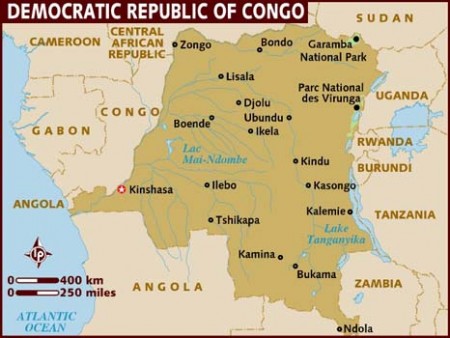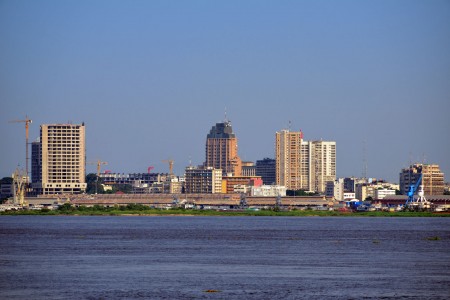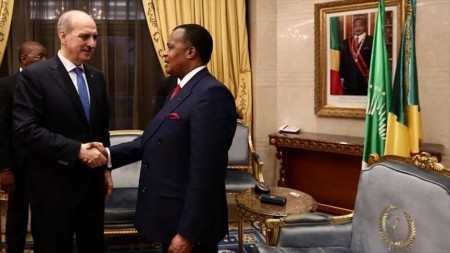The Democratic Republic of the Congo (DRC) simply either Congo or the Congo, and historically Zaire, is a country in Central Africa. It is, by area, the largest country in sub-Saharan Africa, the second-largest in all of Africa (after Algeria), and the 11th-largest in the world. With a population of around 103 million, the Democratic Republic of the Congo is the most-populous officially Francophone country in the world, as well as the 2nd-most populous country in Africa (after Nigeria), and the 13th-most populous country in the world. Since 2015, the Eastern DR Congo has been the scene of an ongoing military conflict in Kivu.
Centred on the Congo Basin, the territory of the DRC was first inhabited by Central African foragers around 90,000 years ago and was reached by the Bantu expansion about 3,000 years ago. In the west, the Kingdom of Kongo ruled around the mouth of the Congo River from the 14th to 19th centuries. In the northeast, centre and east, the kingdoms of Azande, Luba and Lunda ruled from the 16th and 17th centuries to the 19th century.

On 17 May 1997, Laurent-Désiré Kabila, a leader of Tutsi forces from the province of South Kivu, became President after Mobutu fled to Morocco, reverting the country’s name to the Democratic Republic of the Congo. Tensions between President Kabila and the Rwandan and Tutsi presence in the country led to the Second Congo War from 1998 to 2003. Ultimately, nine African countries and around twenty armed groups became involved in the war, which resulted in the deaths of 5.4 million people. The two wars devastated the country. President Laurent-Désiré Kabila was assassinated by one of his bodyguards on 16 January 2001 and was succeeded eight days later by his son Joseph, under whom human rights in the country remained poor and included frequent abuses such as forced disappearances, torture, arbitrary imprisonment and restrictions on civil liberties according to NGOs.
The Democratic Republic of the Congo is extremely rich in natural resources but has suffered from political instability, a lack of infrastructure, corruption, and centuries of both commercial and colonial extraction and exploitation with little widespread development. Besides the capital Kinshasa, the two next largest cities, Lubumbashi and Mbuji-Mayi are both mining communities. DR Congo’s largest export is raw minerals, with China accepting over 50% of DRC’s exports in 2012. In 2016, DR Congo’s level of human development was ranked 176th out of 187 countries by the Human Development Index. As of 2018, around 600,000 Congolese have fled to neighbouring countries from conflicts in the centre and east of the DRC.Two million children risk starvation, and the fighting has displaced 4.5 million people.The sovereign state is a member of the United Nations, Non-Aligned Movement, African Union, and COMESA. Three-fifths of the Congo basin lies in the DR Congo. It is a low-lying area surrounded by mountains on three sides.

Relations between Turkey and the Republic of Congo
Political relations between Turkey and the Republic of the Congo were established in 1960, following Congo’s independence.
The visit by Congolese President Denis Sassou Nguesso to Turkey in November 2012 has given impetus to the relations, with many agreements being signed on this occasion. The first Joint Economic Commission Meeting was held in Brazzaville in June 2013 and the following one was held in April 2015 in Ankara.
Congo’s Embassy in Turkey was opened in 2013, while Turkey’s Embassy in Congo was opened in 2014. There is a political consultation mechanism between the Ministries of Foreign Affairs of the two countries.
The Republic of the Congo has an important economic potential thanks to its oil production. In recent years, a number of Turkish contracting companies have shown interest in Congo and realized important projects. In this context, the Brazzaville International Conference Centre was built with Turkish Eximbank credits and was opened on 20 June 2017 with the participation of Deputy Prime Minister Numan Kurtulmuş.
Turkey’s exports to Congo amounted to 55.79 million Dollars and imports to 1.471 million Dollars in 2019. Total bilateral trade volume was 57.250 million in 2019.
While wood and wood products constitute the main items of Turkey’s imports from Congo, Turkey’s exports to Congo mainly comprise of meat products, poultry, processed grain, electrical appliances and machinery.


